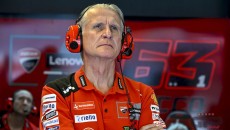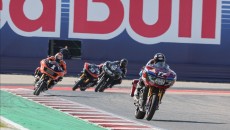What is the Suzuka 8 Hours? An endurance race. The last of the 2018/19 season of the EWC. A classic. All correct answers, but they don't explain what this event means to Japanese manufacturers. It's not for nothing that, in order to win in the past, the Japanese houses didn't hesitate to (and continue not to) side the MotoGP superstars with the SBK. From Mick Doohan to Casey Stoner, and also Valentino Rossi and Jonathan Rea, the list is very long.
The Japanese often say that a victory at the Suzuka 8 Hours is worth as much as a world title, but it's only a simplification that doesn't explain the true meaning of this race. With a life spent among the circuits in every corner or the globe and, of course, also at the most famous 8 Hours, Carlo Fiorani, Racing Operations Manager for Honda Europe, tries to explain.
"The first image that comes to mind when talking about the of Suzuka 8 Hours is a big party," he stated at end of the day, when the Top Ten Trial was cancelled because of a typhoon. "Due to bad weather today, there wasn't that much action on the track, but the paddock was still packed. "It's an event that those who work at Honda, but also in other companies, don't want to miss. They come with their entire families, wives and children, to meet colleagues. Like I said, it's an excuse to party."
It's kind of another world. Far from the MotoGP. In a certain sense, it's more family-like. Because the 8 Hours was created in Suzuka in 1978, and the Japanese feel particularly attached to it.
"It took me years to understand its true spirit." Fiorani confessed. "An explanation is that the MotoGP is an extremely technological challenge. The 8 Hours a human challenge."
In the world championship, the rider has all the honors but also all the burdens, despite the fact that teamwork is fundamental at all levels while, at Suzuka, it's the team that makes the difference.
"Teamwork here is brought to the highest levels and with a typically Japanese mentality," continued the manager. "The Japanese always work in a team. They don't have an actual boss but a coordinator. Everyone has the right to express his or her opinion, and this happens in total harmony. They like the 8 Hours because it represents this philosophy: each person chips in, and they win or lose, all together. Besides being a competition between manufacturers, it's a competition between teams and, in this sense, profoundly human. This is the what they love about it."
It's a microcosm that has nothing to do with the well-known European competitions. It's another dimension.
"Just think, the local TV stations build entire programs, along with the fans, from the stands," explained Fiorani.









